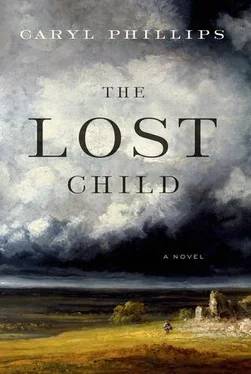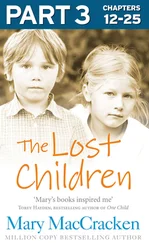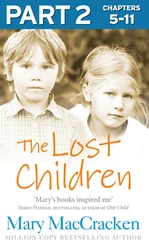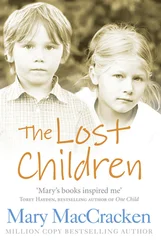Caryl Phillips - The Lost Child
Здесь есть возможность читать онлайн «Caryl Phillips - The Lost Child» весь текст электронной книги совершенно бесплатно (целиком полную версию без сокращений). В некоторых случаях можно слушать аудио, скачать через торрент в формате fb2 и присутствует краткое содержание. Год выпуска: 2015, Издательство: Farrar, Straus and Giroux, Жанр: Современная проза, на английском языке. Описание произведения, (предисловие) а так же отзывы посетителей доступны на портале библиотеки ЛибКат.
- Название:The Lost Child
- Автор:
- Издательство:Farrar, Straus and Giroux
- Жанр:
- Год:2015
- ISBN:нет данных
- Рейтинг книги:3 / 5. Голосов: 1
-
Избранное:Добавить в избранное
- Отзывы:
-
Ваша оценка:
- 60
- 1
- 2
- 3
- 4
- 5
The Lost Child: краткое содержание, описание и аннотация
Предлагаем к чтению аннотацию, описание, краткое содержание или предисловие (зависит от того, что написал сам автор книги «The Lost Child»). Если вы не нашли необходимую информацию о книге — напишите в комментариях, мы постараемся отыскать её.
is a sweeping story of orphans and outcasts, haunted by the past and fighting to liberate themselves from it. At its center is Monica Johnson — cut off from her parents after falling in love with a foreigner — and her bitter struggle to raise her sons in the shadow of the wild moors of the north of England. Phillips intertwines her modern narrative with the childhood of one of literature’s most enigmatic lost boys, as he deftly conjures young Heathcliff, the anti-hero of
, and his ragged existence before Mr. Earnshaw brought him home to his family.
The Lost Child
Wuthering Heights
Booklist
The New York Times Book Review
The Lost Child
The Lost Child — читать онлайн бесплатно полную книгу (весь текст) целиком
Ниже представлен текст книги, разбитый по страницам. Система сохранения места последней прочитанной страницы, позволяет с удобством читать онлайн бесплатно книгу «The Lost Child», без необходимости каждый раз заново искать на чём Вы остановились. Поставьте закладку, и сможете в любой момент перейти на страницу, на которой закончили чтение.
Интервал:
Закладка:
Thirty years ago Miss Patterson had been a vivacious, buxom young shopgirl who, from the time she left school at fourteen, had taken the eyes of the local lads, all of whom fell over themselves trying to get her to agree to go out with them. He’d known that if he was going to stand a chance, he’d have to somehow conquer his ineptitude and give over yanking at doors marked PUSH, or forgetting which pocket he’d put his bus ticket in when the inspector got on. Once he had acquired enough discipline to stop betraying himself, he started to woo her, and as he hoped might be the case, it was she who began to ask questions of him when he stopped in for his Yorkshire Post and ten Woodbines on his way to his very first teaching job. He imagined that the briefcase and suit helped rouse her curiosity, plus the fact that he eschewed a cap and chose to go about bareheaded, but whatever it was, it was soon obvious that the curvaceous Patterson girl in the shop was going to be his bride even though people, including his own parents, might well be surprised to see him stooping down to the bottom drawer and marrying a girl without his advantages.
She peeled off her apron and carefully draped it over the back of a chair as she spoke. “When I was younger, I’d have killed for the kind of kitchen facilities you lot have at your fingertips. I mean, you don’t know you’re born really, do you?” It was with some surprise, and alarm, that she found herself jabbering away to her daughter, for whom she had once happily baked and even encouraged to lick the cake mix from the bowl. However, one day teenage Monica suddenly turned her nose up in the air at such foolishness, and she did so with a flash of meanness that convulsed their relationship into a premature formality that made her mother want to weep for her loss. And now, she wondered, what does our Monica see beyond a pudgy woman whose poor neck is little more than a wide set of stairs descending from her ears down to her shoulders, and whose bust contains the secret of a growth that her doctor claims is “well under control”? “But remember,” insisted Dr. Owen, “it’s only a fool, Ruth, who tries to push open the door to the future.” She looked closely at Monica, and wanted to clutch her daughter to her bosom and confess to her the source of her fretting, but she was shaken out of her abstraction by a sudden storm of footsteps up above, which could mean only one thing.
“I’m sorry, love, but I should have said. You will be stopping here tonight, won’t you?”
“I can’t. I’ve made arrangements for lodgings.” Her mother looked dumbfounded, so Monica continued. “We can stay for another hour.”
“But surely you don’t have to go up to Leeds today? It’s Saturday. And the kiddies should nap some more. They need their rest.”
Ronald Johnson sat upstairs in the bedroom at his desk, but he was finding it impossible to concentrate, for he could hear the pair of them in the kitchen. He threw down his fountain pen with more force than he had intended and watched as the gushing ink described a near-perfect semicircle, which began boldly at one end and tapered to a thin italic whisper at the other. He made a gavel of his hand and noiselessly pounded the desktop and demanded silence, for he needed to concentrate. For Christ’s sake, what’s with all this ruddy carrying on? He didn’t like to consider it too deeply, but in nearly thirty years of marriage his wife had completely failed to introduce a single topic into their table talk that had either surprised or even interested him. Was that too much to ask for, a question that he might research, or an issue that it was possible for them to exchange ideas about? And now what was she trying to do to their daughter, whose education should have placed her beyond Ruth’s influence? Was this to be his legacy, two gossiping women and two misfit children? He stared at the defaced fair copy of his report and silently shook his head. It troubled him to admit that at some point he had made a decision to marry a shopgirl who wouldn’t even be able to take charge should an emergency be forced upon them. As he opened the desk drawer to search for some blotting paper, the unfairness of the situation continued to darken his humour.
At just before seven, he dropped Monica and her two children at the train station. He removed her hefty suitcase from the boot of the car, and then he and his wife followed their daughter, whose boys clung to her, one to each hand, down the full length of the platform. Monica was hurrying, like somebody who’d heard the five o’clock whistle, and he could see that her slip was showing, but he knew that it wouldn’t do to say anything. For a moment it crossed his mind that perhaps there was some mystery man with whom she would be rendezvousing when she stepped down from the train in thirty-two minutes’ time? Or maybe she really did have an unnamed coworker who had agreed to meet her and the children and take them to their new flat. Monica temporarily released the two boys, and she gave her father an unenthusiastic hug, which made him feel foolish. She then kissed her silent mother on the cheek and moved away before her mother could grab her arm.
“Take care,” he said as he hoisted the suitcase up and onto the train after her and the children. She looked down at him with a puzzled expression. “Of yourself, I mean.”
“And you take care too,” she said. “Of yourself.”
III. GOING OUT
She wiped Tommy’s mouth with her hand and then shoved the remains of the food into a bag that she slung up onto her shoulder. She had saved a salad cream sandwich in case her older boy was hungry, but when she looked around, she still couldn’t see him. The sun had gone behind a cloud, and it looked like it might rain, so she knew that it was time to leave this sorry excuse for a park that was littered with dog mess and empty beer cans and pop bottles. Having straightened Tommy’s shirt, she looked again and spotted Ben playing on the swings with a group of Pakistani children, but when she called to him, he ignored her and kicked his feet up in an attempt to climb even higher. “Don’t you make me have to come and fetch you.” She could feel the intrusive stares from the foreign men and women, who sat on the grass in a circular group around a seemingly endless supply of food that the wives had no doubt slaved over. They behaved like it was their park, which in a way it was now.
When Ben saw her striding towards him, he jumped from the swing and ran and hid behind a tree. “Ben!” Ten years old now, she thought, and still playing the fool. “You stop right where you are or I’ll give you what for.” He darted out into the open and then hid behind another thick oak, but he knew it was no use.
“Okay, I give up,” he said as he walked towards her. She twisted her grip on his wrist and accidentally gave him a Chinese burn.
“Oi, leave me alone!”
Then, with her free hand, she slapped the back of his head, which served only to make her palm sting. The Pakistani kids began to laugh out loud and point, irritating her no end. However, she didn’t want to say anything to the little buggers in front of their parents, so she just glared at them as she frog-marched Ben back in the direction of his temporarily abandoned brother. Ben turned up his nose at the salad cream sandwich, so she asked him again just to make sure. “So you’re not hungry then?” He shook his head, but he still wouldn’t meet her eyes. “Right then, it’s staying in the bag, and don’t bother me with any nonsense on the way home. Come on, we didn’t bring a brolly, so we’ll have to be lively.”
The wide entrance to the park bespoke a civic ambition that had never truly come to fruition. To the left of the iron gates stood an immodestly large statue of a former lord mayor that was now speckled in bird droppings, while the ceremonial urns on top of each gatepost sprouted thriving weeds. As she passed out of the park and turned right into Stanhope Lane, she silently reattached Ben’s hand to that of his brother and looked at the older boy in a manner that let him know that he should not let go. The roots of the trees had cracked and displaced the flagstones on this stretch of pavement, so it was treacherous for an adult, let alone two kids to try and walk here. They wandered by dismal-looking pubs and corner shops with paint peeling from their facades and windows that were securely grilled, but she understood that these places had no need to attract clients, for the faces that appeared each day, and the words they uttered, were as depressingly predictable as the cast and script of a long-running soap opera. After four years as a librarian in this run-down city that, despite the evidence of increased poverty, recently had the temerity to make a bid to host the Commonwealth Games, she was quietly desperate to escape back to Oxford, or even back to London, where she thought she might make a better fist of it given a second chance. Stamping out books five days a week, and rearranging shelves, and keeping the periodical subscriptions up to date, and shooing tramps, before spending her weekends at the park with the kids, was doing her no good at all. But what choice did she have? When she finally worked up enough courage to contact the admissions office at her old college, they wrote back and told her that she would be most welcome to return and complete the final year of her degree, but only after she had “established a domestic situation that would be compatible with study.” She scrutinized the piece of yellowish notepaper embossed with the college’s crest, and she read and reread the offending words.
Читать дальшеИнтервал:
Закладка:
Похожие книги на «The Lost Child»
Представляем Вашему вниманию похожие книги на «The Lost Child» списком для выбора. Мы отобрали схожую по названию и смыслу литературу в надежде предоставить читателям больше вариантов отыскать новые, интересные, ещё непрочитанные произведения.
Обсуждение, отзывы о книге «The Lost Child» и просто собственные мнения читателей. Оставьте ваши комментарии, напишите, что Вы думаете о произведении, его смысле или главных героях. Укажите что конкретно понравилось, а что нет, и почему Вы так считаете.












